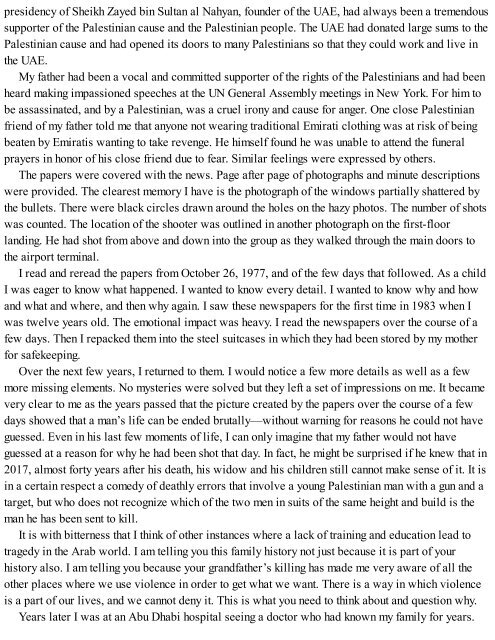1250119847
You also want an ePaper? Increase the reach of your titles
YUMPU automatically turns print PDFs into web optimized ePapers that Google loves.
presidency of Sheikh Zayed bin Sultan al Nahyan, founder of the UAE, had always been a tremendous<br />
supporter of the Palestinian cause and the Palestinian people. The UAE had donated large sums to the<br />
Palestinian cause and had opened its doors to many Palestinians so that they could work and live in<br />
the UAE.<br />
My father had been a vocal and committed supporter of the rights of the Palestinians and had been<br />
heard making impassioned speeches at the UN General Assembly meetings in New York. For him to<br />
be assassinated, and by a Palestinian, was a cruel irony and cause for anger. One close Palestinian<br />
friend of my father told me that anyone not wearing traditional Emirati clothing was at risk of being<br />
beaten by Emiratis wanting to take revenge. He himself found he was unable to attend the funeral<br />
prayers in honor of his close friend due to fear. Similar feelings were expressed by others.<br />
The papers were covered with the news. Page after page of photographs and minute descriptions<br />
were provided. The clearest memory I have is the photograph of the windows partially shattered by<br />
the bullets. There were black circles drawn around the holes on the hazy photos. The number of shots<br />
was counted. The location of the shooter was outlined in another photograph on the first-floor<br />
landing. He had shot from above and down into the group as they walked through the main doors to<br />
the airport terminal.<br />
I read and reread the papers from October 26, 1977, and of the few days that followed. As a child<br />
I was eager to know what happened. I wanted to know every detail. I wanted to know why and how<br />
and what and where, and then why again. I saw these newspapers for the first time in 1983 when I<br />
was twelve years old. The emotional impact was heavy. I read the newspapers over the course of a<br />
few days. Then I repacked them into the steel suitcases in which they had been stored by my mother<br />
for safekeeping.<br />
Over the next few years, I returned to them. I would notice a few more details as well as a few<br />
more missing elements. No mysteries were solved but they left a set of impressions on me. It became<br />
very clear to me as the years passed that the picture created by the papers over the course of a few<br />
days showed that a man’s life can be ended brutally—without warning for reasons he could not have<br />
guessed. Even in his last few moments of life, I can only imagine that my father would not have<br />
guessed at a reason for why he had been shot that day. In fact, he might be surprised if he knew that in<br />
2017, almost forty years after his death, his widow and his children still cannot make sense of it. It is<br />
in a certain respect a comedy of deathly errors that involve a young Palestinian man with a gun and a<br />
target, but who does not recognize which of the two men in suits of the same height and build is the<br />
man he has been sent to kill.<br />
It is with bitterness that I think of other instances where a lack of training and education lead to<br />
tragedy in the Arab world. I am telling you this family history not just because it is part of your<br />
history also. I am telling you because your grandfather’s killing has made me very aware of all the<br />
other places where we use violence in order to get what we want. There is a way in which violence<br />
is a part of our lives, and we cannot deny it. This is what you need to think about and question why.<br />
Years later I was at an Abu Dhabi hospital seeing a doctor who had known my family for years.
















